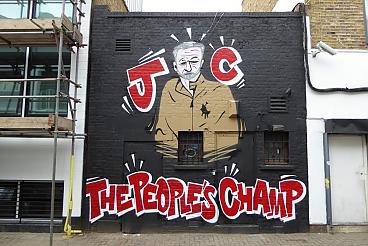The media too must get used to the end of ‘market think’
The media too must get used to the end of ‘market think’
The national daily NRC’s comments on the possible re-election of Jeremy Corbyn as leader of the British Labour Party are strange indeed. Apparently his re-election would mean that Labour will be out of power for the next twenty years. Pure tunnel vision: apparently only parties that continue to believe in the market as a solution for everything can expect to be elected to government. We in the SP believe in people’s power. If hundreds of thousands voted for Corbyn and in doing so voted also for an end to the neoliberal thought which has characterised Labour since Tony Blair, it isn’t a ticket for permanent opposition, but the beginning of a new era.

Jeremy Corbyn’s re-election was convincing, with almost two-thirds of the votes going to the incumbent. The question is what all Labour’s Blairite MPs will do now. They wanted to get rid of Corbyn, after all, on the grounds that he was too extreme and, above all, wasn’t a good leader for the party. Yet the number of Labour Party members has grown enormously and leadership is surely more than anything the power to mobilise people, the ability to inspire them and give them hope that things will change. These are all qualities which Corbyn possesses, as the leadership election result has demonstrated.
The question remains as to whether Labour will indeed still be able to win an election. The general opinion in the media is that this has become difficult, if not impossible. The NRC draws a parallel with the 1980s, when Margaret Thatcher was able to remain in power for the entire decade. Only when Blair’s ‘New Labour’ embraced neoliberalism did Labour return to government. But this parallel makes no sense. Precisely because we’ve gone through thirty years of neoliberalism, we know that the market is anything but the solution to everything. We have seen and are seeing that uncontrolled marketisation has increased inequality in society and continues to do so, and that the greed of bankers and the irresponsible speculation which led to the financial and economic crisis of recent years were a direct result of handing more and more over to the market. We’ve seen also experienced the bureaucracy which privatisation of public services and the unavoidable need for supervision which this creates have brought with them. We know the consequences of the destructive policies which are attached to ‘small government’ and ‘clear space for the market’.
The unexpected success of Bernie Sanders in the US and of Jeremy Corbyn in Great Britain, as well as that of the campaign for a national health fund in the Netherlands, all represent the same trend. More and more people want a change of policy, policies for which not the market but ordinary people and the neighbourhoods in which they live form the basis. The media had better get used to this, perhaps because the commercial media have themselves been the victims of marketisation. It will, however, become ever more difficult to continue to deny social developments. I predict also, therefore, that if Corbyn presses ahead and if necessary lets Blairite malcontents split, he will in the end emerge as winner of the struggle in a general election. His feel for social developments is better than that of some of the media.
- See also:
- Dennis de Jong
